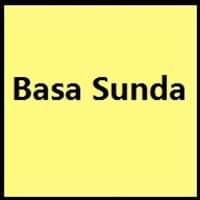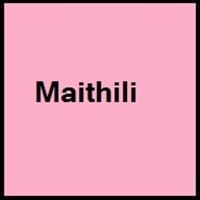Sundanese and Maithili
Countries
West Java
India, Nepal
National Language
Indonesia
India, Nepal
Second Language
Not spoken in any of the countries
Nepal
Speaking Continents
Asia
Asia
Minority Language
Not spoken in any of the countries
Not spoken in any of the countries
Regulated By
Not Available
Not Available
Interesting Facts
- The Sundanese language is second most widely spoken regional language in Indonesia.
- Earlier, Maithili language was considered as the dialect of Hindi and Bengali, however in the year 2003 Maithili achieved an independent language status in India.
- Maithili has rich literature.
Similar To
Madurese and Malay Languages
Bhojpuri Language
Derived From
Not Available
Not Available
Alphabets in
Sundanese-Alphabets.jpg#200
Maithili-Alphabets.jpg#200
How Many Consonants
Not Available
Scripts
Latin, Sundanese
Devanagari
Writing Direction
Left-To-Right, Horizontal
Not Available
Thank You
Nuhun
dhanyabad
How Are You?
Kumaha kabarna?
Aahan kehan chhi ?
Good Night
Wilujeng kulem
Śubharātri
Good Evening
Wilujeng wengi
shubh sandhya
Good Afternoon
Wilujeng siang
dopahar ke bad namaskar
Good Morning
Wilujeng énjing
Suprabhaat
Bye
Wilujeng angkat
Alavidā
I Love You
Abdi bogoh ka anjeun
hawm ahāṃ se prem karechi
Dialect 1
Western dialect
Tharuwat
Where They Speak
Banten
Nepal
Dialect 2
Northern dialect
Madhubani
Where They Speak
Bogor
North India
Dialect 3
Priangan dialect
Khortha
Where They Speak
Bandung
Deoghar, France
Second Language Speakers
Not Available
Native Name
Not Available
मैथिली (mɛtʰilī)
Alternative Names
Priangan, Sunda
Apabhramsa, Bihari, Maitili, Maitli, Methli, Tirahutia, Tirhuti, Tirhutia
French Name
soundanais
maithili
German Name
Sundanesisch
Maithili
Pronunciation
Not Available
Not Available
Ethnicity
Sundanese, Bantenese, Cirebonese, Badui
Maithil
Origin
5th century AD
14th century
Language Family
Austronesian Family
Indo-European Family
Subgroup
Indonesian
Not Available
Branch
Not Available
Not Available
Early Forms
No early forms
No early forms
Standard Forms
Sundanese
Standard Maithili
Language Position
Not Available
Signed Forms
Not Available
Not Available
Scope
Individual
Individual
ISO 639 1
su
No data available
ISO 639 6
Not Available
Not Available
Glottocode
sund1251
mait1250
Linguasphere
No data available
No data available
Language Type
Living
Living
Language Linguistic Typology
Subject-Verb-Object
Not Available
Language Morphological Typology
Not Available
Not Available
All Sundanese and Maithili Dialects
Most languages have dialects where each dialect differ from other dialect with respect to grammar and vocabulary. Here you will get to know all Sundanese and Maithili dialects. Various dialects of Sundanese and Maithili language differ in their pronunciations and words. Dialects of Sundanese are spoken in different Sundanese Speaking Countries whereas Maithili Dialects are spoken in different Maithili speaking countries. Also the number of people speaking Sundanese vs Maithili Dialects varies from few thousands to many millions. Some of the Sundanese dialects include: Western dialect, Northern dialect. Maithili dialects include: Tharuwat , Madhubani. Also learn about dialects in South American Languages and North American Languages.
Sundanese and Maithili Speaking population
Sundanese and Maithili speaking population is one of the factors based on which Sundanese and Maithili languages can be compared. The total count of Sundanese and Maithili Speaking population in percentage is also given. The percentage of people speaking Sundanese language is 0.57 % whereas the percentage of people speaking Maithili language is 0.41 %. When we compare the speaking population of any two languages we get to know which of two languages is more popular. Find more details about how many people speak Sundanese and Maithili on Sundanese vs Maithili where you will get native speakers, speaking population in percentage and native names.
Sundanese and Maithili Language Codes
Sundanese and Maithili language codes are used in those applications where using language names are tedious. Sundanese and Maithili Language Codes include all the international language codes, glottocodes and linguasphere.





